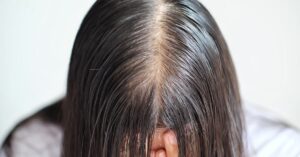Table of Contents
Effective Natural Remedies to Combat Greasy Hair
Greasy hair can be both frustrating and embarrassing. It can make clean hair appear dirty and limp, especially for those with lighter hair colors, which tend to show oil more visibly. While an oily scalp is often due to excessive sebum production, there are natural remedies and lifestyle adjustments that can help control this issue without resorting to chemical-based products.

Effective Natural Remedies to Combat Greasy Hair
Understanding the Causes of Greasy Hair
Before diving into remedies, it’s essential to understand the root causes of greasy hair. Excess sebum production is generally caused by the overactivity of the sebaceous glands. Although sebum is essential for a healthy scalp, an overproduction can lead to scalp issues such as dandruff, acne, and even hair thinning. Fortunately, several natural methods can help manage and prevent greasy hair.
1. Maintain a Balanced Diet
How Diet Affects Sebum Production
Research has shown that the foods we eat directly impact the production of sebum on our scalp. Diets high in unhealthy fats and processed carbohydrates can stimulate excess oil production, whereas healthy fats can balance it. Consider incorporating more healthy fats such as omega-3s from fish, nuts, and seeds, as they may reduce sebum levels and improve hair health.
Tips for a Balanced Diet
Opt for lean proteins, complex carbohydrates, and healthy fats. Aim for a diet rich in vegetables, whole grains, and omega-3s, which have been shown to reduce acne and sebum production in the scalp.
2. Shampoo Regularly but Wisely
While frequent shampooing can be beneficial for greasy hair, using the right type of shampoo is crucial. For those with oily hair, consider a gentle, sulfate-free shampoo designed specifically for oily hair. Avoid harsh chemicals that can strip your scalp of essential oils, as this can actually trigger more oil production as a protective response.
DIY Anti-Dandruff and Oily Scalp Shampoo
If dandruff is a concern, you can try a homemade shampoo using tea tree oil or peppermint oil, which both have antimicrobial properties. This helps to reduce scalp fungus and maintain oil levels.
3. Apple Cider Vinegar for Scalp Health
Apple cider vinegar (ACV) is an excellent home remedy for balancing scalp pH and controlling excess oil production. ACV has antimicrobial properties that can reduce fungus, which may exacerbate oily hair. To use, dilute two tablespoons of ACV with a cup of water and apply it to your scalp with a spray bottle. Leave it on for 2-3 minutes before rinsing.
Benefits of ACV for Hair
Apple cider vinegar can help balance scalp pH, reduce oiliness, and soothe irritation. Just be sure to avoid overuse as it can be drying if applied too frequently.
4. Use a DIY Dry Shampoo
Dry shampoo is a lifesaver for managing oil between washes. You can make a simple dry shampoo at home using arrowroot powder, which is an alternative to baby powder (ensure it’s asbestos-free). Simply sprinkle it onto your scalp, let it sit for a minute, and brush through. This absorbs excess oil without the need for water.
5. Witch Hazel for a Natural Astringent
Witch hazel works as a natural astringent and can help reduce oil production by closing the pores on your scalp. Apply a few drops mixed with water to your scalp before washing your hair. This can help limit oil production, making your hair feel fresher for longer.
Why Witch Hazel Works
Witch hazel is often used in skincare for its ability to control excess oil. Using it on your scalp helps manage greasy hair without drying out the strands.
6. Egg Yolk Hair Mask for Deep Conditioning
Egg yolks are rich in sulfur, protein, and lecithin, which can help improve scalp health and reduce greasiness. Apply an egg yolk hair mask once a week to nourish your scalp and add shine to your hair. Mix egg yolks with a few drops of lemon juice and apply to dry hair for 15-20 minutes before rinsing thoroughly.
7. Tea Tree Oil for Controlling Sebum Production
Tea tree oil is a powerful antimicrobial that can help balance sebum production on the scalp. Adding a few drops to your shampoo or conditioner may help keep your scalp clean and reduce oiliness. This is particularly helpful if oily hair is combined with scalp acne or itching.
How to Use Tea Tree Oil Safely
Always dilute tea tree oil before applying it to your scalp, as it can be too strong on its own. Mix a few drops with coconut oil or add to a sulfate-free shampoo.
Conclusion
Managing greasy hair doesn’t have to be challenging or expensive. By adjusting your diet, choosing gentle hair care products, and using natural ingredients like apple cider vinegar, witch hazel, and tea tree oil, you can reduce scalp oiliness and maintain healthy hair. Remember that a balanced scalp is key to overall hair health, and these natural remedies are gentle enough for regular use.